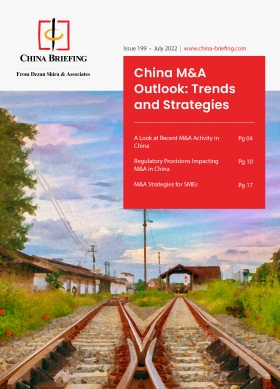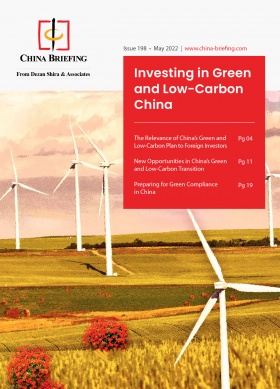How to Prevent Trademark Revocation in China: Attorney’s View
Trademark revocation could happen to a successfully registered trademark if the trademark owner uses or manages the trademark improperly. Should a trademark get canceled or revoked, the trademark owner will suffer not only economic loss but also severe disruption to its marketing plans and brand strategy. There is also a risk that the trademark owner will lose the trademark permanently after the one-year period before re-application for use of the affected trademark. Foreign investors are thus advised to take active measures to prevent trademark revocation and cancelation. For more information regarding trademark revocation, please contact Monica Li, Manager of Business Advisory Services, Beijing Office.
More and more marketing players from overseas are registering their trademarks in China. While it is indeed wise to be proactive about protecting intellectual property (IP), registering the trademark in China alone is not enough. In some cases, your trademark could be revoked or canceled by the Trademark Office, if it comes under the scope of certain conditions.
In this article, we address some of the most frequently asked questions about trademark revocation in China, including what will lead to trademark revocation, what are the consequences of trademark revocation, and how to prevent trademark revocation in the country.
What are the common grounds for trademark revocation in China?
According to the Trademark Law of China, a registered trademark can be revoked or canceled by the Trademark Office upon ex officio (as a result of one’s status or position) or a third party’s application based on the following grounds:
- Where the trademark registrant fails to renew the trademark in time. A registered trademark shall be valid for 10 years, commencing from the date of registration. Upon expiry of the validity period of a registered trademark, where the trademark registrant intends to continue using the trademark, it shall complete renewal formalities pursuant to the provisions within the 12-month period before the expiry date; where renewal formalities are not completed within the stipulated period, a six-month extension (grace period) may be allowed. Where renewal formalities are not completed upon expiry of the validity period, the registered trademark shall be cancelled.
- Where the trademark fails to use the trademark properly. The Chinese trademark law stipulates that the trademark shall be used consistently with what has been registered). Any arbitrary change to the registration matter, such as the color (if the color was specified when registering), font, or combination of each element, etc., will be deemed as non-standard use of the trademark. The trademark registrant would be ordered to make the correction within a stipulated period by the local administration for market regulation (local AMR), otherwise, the registered trademark will be revoked by the Trademark Office.
- Where the trademark registrant fails to practically and continuously use the registered trademark. The Chinese trademark law requires that the registered trademark shall be actually and continuously used on the goods/services that it has been registered for, in the territory/region it is registered in. If it has not been used for three years consecutively, without a proper reason, any organization or individual may apply to the Trademark Office for the revocation of the said registered trademark.
- Where a registered trademark becomes a generic name of the commodities for which it is approved. Under Chinese laws and regulations, where the relevant public generally believes that a certain name can refer to a class of goods, it shall be recognized as a generic name. For example, Simmons (in Chinese, 席梦思,xí mèng sī) was originally a trademark registered in the US by Mr. Zalmon G. Simmons and used for his mattress brand. It was widely used in China by the public to refer to ‘refined spring mattress’, such that in 2005, the Trademark Office declined the registration application of Simmons (席梦思) citing that it had become a generic name in China.
Among the four grounds, the third one — failing to use the registered trademark actually and continuously — is the most common reason that has led to trademark revocation in China in recent years.
What is the possible motive for the applicant to apply for revoking another’s trademark?
In the era of global integration and development of internet technology, all market players (enterprises or individuals) have more routes to gain knowledge of other’s IP, such as the trademark, and the profitability behind it. The applicants may want to take advantage of the business value attached to the trademark by getting the trademark revoked or canceled and then registering the trademark by themselves.
In other cases, it’s possible that the applicant may find that there are similar trademarks that have been registered when they try to apply for a trademark for their own products or services, which may block their own registration. In such circumstances, they may strategically try to get the prior trademark revoked or canceled to clear their way for trademark registration.
What are the consequences of trademark revocation?
Where a trademark gets canceled or revoked, the trademark can no longer be legally used on the registered goods/services, which might cause economic loss. The trademark owner’s marketing plan might be badly affected because of losing the trademark right.
Also, where a trademark gets revoked or cancelled, then within one year from the revocation or cancellation, the Trademark Office will not approve trademark registration applications for trademarks that are identical or similar to the said trademark. It means that if the trademark owner wants to register the trademark again, it shall have to wait for at least one year.
When the trademark owner is finally able to submit the trademark application one year afterward, the competitor could also submit a similar registration application at the same time.
If unfortunately such a competitor’s application is submitted earlier than the original trademark owner’s application, the Trademark Office would definitely reject the original trademark owner’s application due to the ‘first to file’ rule in China for trademark registration.
If the trademark owner continues to use the cancelled/revoked trademark, it may infringe the other’s similar trademark, and lead to a lawsuit filed by the other trademark owner and cause economic compensation liabilities.
What should trademark owners do if their trademarks are applied to be revoked by others?
The Trademark Office may deliver a notification to the trademark owner via its registration attorney who helped with the trademark registration. If the trademark attorney is experienced and well qualified, the notification will be forwarded to the trademark owner in proper time. Any delays or mismanagement in communication in this regard could have costly consequences to the trademark owner.
In the notification, the Trademark Office will require the trademark owner to reply within two months upon receiving the notification to:
- Defend that the trademark is not a generic name for a class of goods;
- Provide evidence of actual use of the said trademark in the past three-year period; or
- State any proper reason for not using the trademark.
Evidence in this case includes but is not limited to, any documentation – invoice, purchase order, contract, or third-party media’s publicity, and so on – which shows that the registered trademark was in use.
With this evidence, the trademark owner especially the overseas trademark owner shall be able to engage an authorized local trademark attorney in China to help review and integrate the evidence, draft the documentation, and submit the reply to the Trademark Office within the given timeline.
If the evidence is deemed as effective and supportive, then the Trademark Office will reject the other’s trademark revocation application. On the contrary, if the evidence is deemed insufficient – the trademark will be revoked by the Trademark Office formally and the relevant notification will be issued.
What should the trademark owner do to prevent its trademark from being canceled or revoked?
Based on the grounds of trademark cancelation and revocation, trademark owners in China are suggested to take the below measures:
- Use the trademark properly, continuously, and actively.
- Have an intellectual property expert monitor the trademark registration status so that quick action can be taken if there is any abnormal trend observed.
Summary
To summarize, it is not enough to get your trademark registered in China. Trademark owners should always use their trademark properly, hire a local trademark attorney to help monitor the trademark status, and take action to reply to any revocation raised by others within the given period.
Dezan Shira & Associates has a lot of experience in dealing with trademark protection, especially with regards to trademark cancellation/revocation cases, which has helped our clients avoid losses. Should you have any needs or inquiries, please feel free to contact our experts at China@dezshira.com.
About Us
China Briefing is written and produced by Dezan Shira & Associates. The practice assists foreign investors into China and has done so since 1992 through offices in Beijing, Tianjin, Dalian, Qingdao, Shanghai, Hangzhou, Ningbo, Suzhou, Guangzhou, Dongguan, Zhongshan, Shenzhen, and Hong Kong. Please contact the firm for assistance in China at china@dezshira.com.
Dezan Shira & Associates has offices in Vietnam, Indonesia, Singapore, United States, Germany, Italy, India, and Russia, in addition to our trade research facilities along the Belt & Road Initiative. We also have partner firms assisting foreign investors in The Philippines, Malaysia, Thailand, Bangladesh.
- Previous Article Investing in China’s Multi-Billion-Dollar Pet Industry – Trends and Opportunities
- Next Article Mortgage Boycott: What’s Going on in China’s Property Market?









